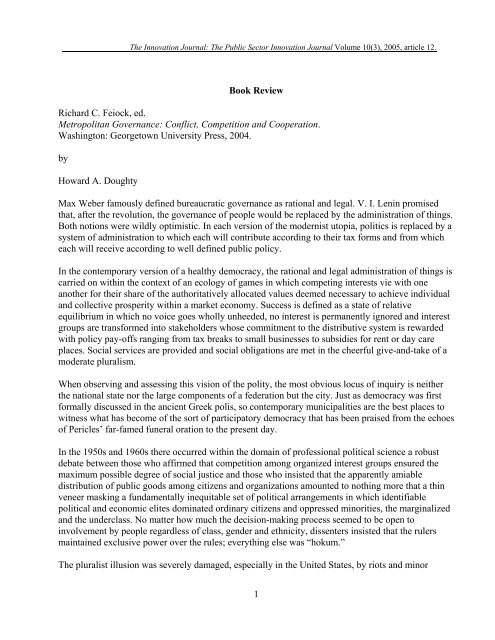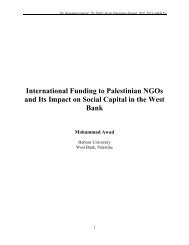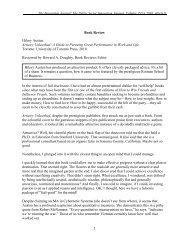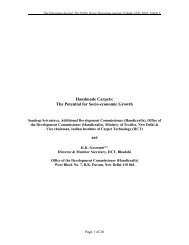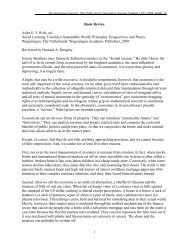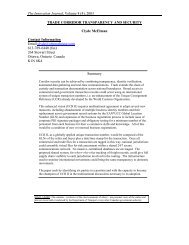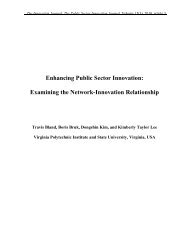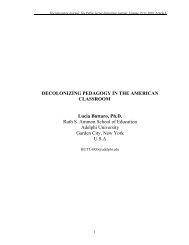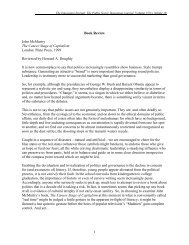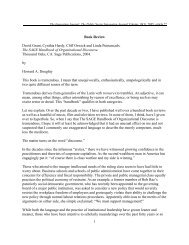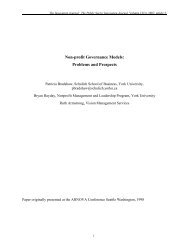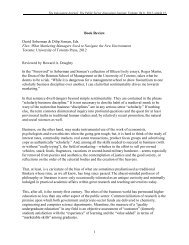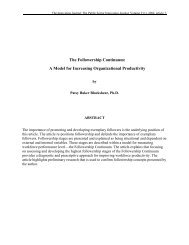Metropolitan Governance: Conflict, Competition and Cooperation
Metropolitan Governance: Conflict, Competition and Cooperation
Metropolitan Governance: Conflict, Competition and Cooperation
You also want an ePaper? Increase the reach of your titles
YUMPU automatically turns print PDFs into web optimized ePapers that Google loves.
The Innovation Journal: The Public Sector Innovation Journal Volume 10(3), 2005, article 12.<br />
Book Review<br />
Richard C. Feiock, ed.<br />
<strong>Metropolitan</strong> <strong>Governance</strong>: <strong>Conflict</strong>, <strong>Competition</strong> <strong>and</strong> <strong>Cooperation</strong>.<br />
Washington: Georgetown University Press, 2004.<br />
by<br />
Howard A. Doughty<br />
Max Weber famously defined bureaucratic governance as rational <strong>and</strong> legal. V. I. Lenin promised<br />
that, after the revolution, the governance of people would be replaced by the administration of things.<br />
Both notions were wildly optimistic. In each version of the modernist utopia, politics is replaced by a<br />
system of administration to which each will contribute according to their tax forms <strong>and</strong> from which<br />
each will receive according to well defined public policy.<br />
In the contemporary version of a healthy democracy, the rational <strong>and</strong> legal administration of things is<br />
carried on within the context of an ecology of games in which competing interests vie with one<br />
another for their share of the authoritatively allocated values deemed necessary to achieve individual<br />
<strong>and</strong> collective prosperity within a market economy. Success is defined as a state of relative<br />
equilibrium in which no voice goes wholly unheeded, no interest is permanently ignored <strong>and</strong> interest<br />
groups are transformed into stakeholders whose commitment to the distributive system is rewarded<br />
with policy pay-offs ranging from tax breaks to small businesses to subsidies for rent or day care<br />
places. Social services are provided <strong>and</strong> social obligations are met in the cheerful give-<strong>and</strong>-take of a<br />
moderate pluralism.<br />
When observing <strong>and</strong> assessing this vision of the polity, the most obvious locus of inquiry is neither<br />
the national state nor the large components of a federation but the city. Just as democracy was first<br />
formally discussed in the ancient Greek polis, so contemporary municipalities are the best places to<br />
witness what has become of the sort of participatory democracy that has been praised from the echoes<br />
of Pericles’ far-famed funeral oration to the present day.<br />
In the 1950s <strong>and</strong> 1960s there occurred within the domain of professional political science a robust<br />
debate between those who affirmed that competition among organized interest groups ensured the<br />
maximum possible degree of social justice <strong>and</strong> those who insisted that the apparently amiable<br />
distribution of public goods among citizens <strong>and</strong> organizations amounted to nothing more that a thin<br />
veneer masking a fundamentally inequitable set of political arrangements in which identifiable<br />
political <strong>and</strong> economic elites dominated ordinary citizens <strong>and</strong> oppressed minorities, the marginalized<br />
<strong>and</strong> the underclass. No matter how much the decision-making process seemed to be open to<br />
involvement by people regardless of class, gender <strong>and</strong> ethnicity, dissenters insisted that the rulers<br />
maintained exclusive power over the rules; everything else was “hokum.”<br />
The pluralist illusion was severely damaged, especially in the United States, by riots <strong>and</strong> minor<br />
1
The Innovation Journal: The Public Sector Innovation Journal Volume 10(3), 2005, article 12.<br />
rebellions as the systemically disenfranchised pushed their way from the obscurity of powerlessness<br />
onto the political stage. Racially <strong>and</strong> economically disinherited citizens made it plain that the good,<br />
gray <strong>and</strong> predictable (<strong>and</strong> predictably hypocritical) political process was vulnerable to angry attack.<br />
In the end, however, accommodations were made, bitterness was bought off <strong>and</strong> a new rendering of<br />
liberal democracy was put in place.<br />
Whether in the form of fiscally restrained new public management or in the exaggerated commitment<br />
to public safety (amply abetted by the rhetorical flourishes of the “war on terror”), a new corporatism<br />
has emerged <strong>and</strong> the voices of dissension are once again muted.<br />
In his anthology, <strong>Metropolitan</strong> <strong>Governance</strong>, Professor Richard C. Feiock of Florida State University<br />
brings forward the views of scholars whose fundamental approach to municipal government is<br />
neither to debate the efficacy of pluralism nor to advance an ideological commitment to the new<br />
public management <strong>and</strong> the neoliberalism that sustains it. Instead, they express a firm dedication to<br />
empirical analysis <strong>and</strong> what might well be called a problem centered focus.<br />
Of special importance to most of the contributors are the factual parameters of city politics, in some<br />
cases including the question of literal boundaries <strong>and</strong> how drawing them in different ways can<br />
completely transform local government. This is not unimportant, for the transformation of urban<br />
government into broad regional arrangements based, for example, on the demographics of massive<br />
extra-urban residential <strong>and</strong> commercial development is an undeniable factor influencing the structure<br />
of governance <strong>and</strong> the means which must be adopted to solve what are seen as eminently practical<br />
problems. A recurrent theme is the difficulty of managing the supersuburbs (populations of 50,000 or<br />
more in municipalities close to a major city), of which the United States has 245 – the largest being<br />
Aurora, Colorado with a population of 276,393, Hialeah, Florida (226,419), Plano, Texas (222,030)<br />
<strong>and</strong> Glendale, Arizona (218,812). Area-wide solutions to transportation <strong>and</strong> infrastructure seem to<br />
dem<strong>and</strong> consolidation, but centrifugal factors – not least of which are local community identities –<br />
remain to be taken into account.<br />
To examine how competition <strong>and</strong> cooperation work in these settings, somewhat abstract analytical<br />
techniques are employed. Game theory, for instance, plays an important part in Annette Steinacker’s<br />
approach to strategies for metropolitan cooperation. Using an “iterated” version of the “Prisoner’s<br />
Dilemma” <strong>and</strong> “Bargaining Games” as the basis for underst<strong>and</strong>ing institutional behavior, she<br />
effectively dehistoricizes <strong>and</strong> decontextualizes political life. Likewise, using multivariate analysis to<br />
assess the capacity of economic development strategies to attract private sector investment, Martin<br />
Johnson <strong>and</strong> Max Neiman evaluate competing methods of “courting business.” Finally, tying data<br />
about parental satisfaction with “charter schools” to notions of social capital <strong>and</strong> community<br />
building, Mark Schneider <strong>and</strong> Jack Buckley conclude that the profusion of charter schools helps to<br />
“open up space for citizens to develop attitudes supportive of trust <strong>and</strong> ultimately … for broader<br />
democratic participation.” Whether the public good is served by any of this is a question that seems<br />
unasked. No doubt gate-guarded communities also build a sense of social security.<br />
Though the prevalence of the gaming metaphor is annoying, Feiock is plainly on to something. Large<br />
concentrations of population in huge metropolitan regions do offer significant challenges to theorists<br />
2
The Innovation Journal: The Public Sector Innovation Journal Volume 10(3), 2005, article 12.<br />
<strong>and</strong> practitioners of municipal politics. Tension between those who seek greater centralization in the<br />
name of efficiency <strong>and</strong> those who prefer decentralization in the quest for community responsiveness<br />
is just one of the major issues that confront authorities <strong>and</strong> citizens alike. As well, funding of local<br />
administrations which are often being compelled to deal with increasingly onerous burdens without<br />
adequate fiscal support from larger levels of government present serious institutional problems.<br />
These <strong>and</strong> related matters (for example, Elaine B. Sharp’s insightful analysis of metropolitan<br />
structures <strong>and</strong> the control of the sex trade <strong>and</strong> attendant “moral” issues) are addressed in interesting<br />
ways.<br />
In the end, however, the overall impression is given that the goal of this book is to assist in achieving<br />
the Weberian-Leninist dream of a rational, legal administration of things. I, for one, think that there is<br />
something more to politics than this <strong>and</strong> that, at some point, new <strong>and</strong> currently unexpressed or<br />
suppressed interests will shake up the well considered "roadmap" to the good society. We have<br />
experienced significant adaptations in the past <strong>and</strong>, when we have, the intellectual “paradigm” that<br />
was safely in place to monitor stability proved as transitory as the political arrangements they were<br />
meant to interpret. Does anyone remember “structural-functionalism” <strong>and</strong> “systems theory”?<br />
Theoretical approaches <strong>and</strong> the actions they are meant to explain involve the identification of<br />
problems <strong>and</strong> the analysis of the customs <strong>and</strong> institutions that people use to solve them. We are all<br />
familiar with such “normal science,” as it is carried on from time to time. The point is that time can<br />
be short <strong>and</strong> unanticipated situations <strong>and</strong> participants have the capacity to redefine abruptly what<br />
count as problems rather than merely engage in the attempt to solve the ones that privileged<br />
“stakeholders” have successfully placed on the formal administrative agenda.<br />
About the Author:<br />
Howard A. Doughty teaches in the Faculty of Applied Arts & Health Sciences at Seneca College in King<br />
City, Ontario. He is a graduate of Glendon College <strong>and</strong> holds postgraduate degrees in Political Science<br />
from the University of Hawaii <strong>and</strong> York Univerity as well as in History <strong>and</strong> Philosophy from the<br />
University of Toronto. He has been Book Review Editor of The Innovation Journal since 1998, <strong>and</strong> was<br />
the editor of Bridges: Explorations in Science, Technology <strong>and</strong> Society (1986-1991) <strong>and</strong> The College<br />
Quarterly (1992-1997), where he continues as Book Review editor as well.<br />
3


